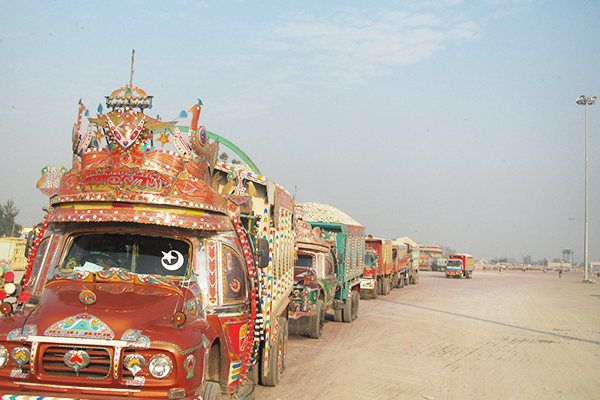
Nazar Ul Islam
Good news: Pakistan-India trade is up.
While the deadly exchange of fire between Pakistani and Indian troops along the Line of Control that divides Kashmir has kept up for most of the year and been widely reported, another story has been entirely ignored: despite the skirmishes, cross-border trade has shot up.
“Trade between India and Pakistan through the Wagah-Attari check post [in Lahore] has almost doubled,” Prem Chand Valeti, a director at India’s commerce ministry told Newsweek. Truck traffic conveying cement, gypsum, sugar, glass, and chemicals from Pakistan to India and vegetable, soybean, cotton, and yarns from India to Pakistan increased some 81 percent compared to last year, he said.
Indian High Commission official Rajesh Kumar Agnihotri attributes the rise in trade volumes to the new border arrangements made last year in April. “The integrated check post at Attari has reduced processing time for both individuals and freight,” he said. “This has paved the way for enhanced people-to-people contact and trade expansion.” Some 300 people cross the Pakistan-India border through the Wagah-Attari check post on a daily basis, he added.
But the current trade volumes are still far from their real potential, said Valeti, contending that Pakistan was held hostage by the “fabricated argument” that trade with India would annihilate its own industries. “This is very strange,” he said, “Pakistan trades with China, whose economy is far bigger than the Indian economy.”
Indian officials hope Pakistan will work toward creating economic common ground to normalize bilateral ties. “European countries fought with each other for centuries,” said planning and development official Anil Bamba, “today, they are trading with each other.” He also cited Sino-India commerce as an example of trade being prioritized over geographical disputes.
Bamba said India is seeking to expand trade with Pakistan beyond the Wagah-Attari check post, through rail links. “Indian Railways is looking into the matter,” he said. “It has constituted a committee to work on the feasibility.”
Trade through freight train may involve some complications. Given historic suspicions that endure between Pakistan and India, neither country currently allows either side’s trucks into its territory. Instead, cargoes are offloaded at the Wagah-Attari border where handlers from each side inspect and reload the goods on their own trucks.
Indian officials say this arrangement works to the advantage of the workforce along the border. “Laborers were getting [Indian] Rs. 5,000 a month before as minimum wage, since the trade opening this has jumped to Rs. 20,000 per month,” said a border official. An Indian cargo handler Newsweek spoke with said the average salary for border labor had improved, but was closer now to half of what the Indian official claimed.
Agnihotri said trade relations between Pakistan and India are a work in progress, but the improved statistics are symbolic nonetheless “of India’s desire for progressive, productive, and mutually-beneficial relationships with neighboring countries.”
From our Jan. 11, 2014, issue.
